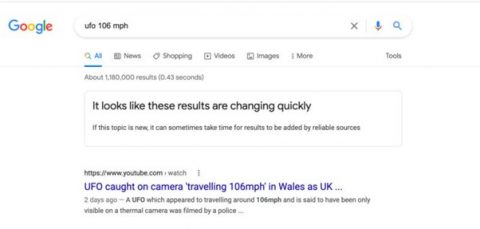What will you find in July’s update?
SEO
Another Month, Another Google Algorithm Update
Fake News? But I Saw It Online?
Does Covid-19 Include A Built-In Adblocker?
Paid Media
Third-Party Cookies Plan Pushed Back Until 2023
You Can No Longer Create New BMM Keywords After Late July
Content Marketing
Brand Values Are Super Important After All
New Content to Get Stuck Into
Getting Creative & Client Wins
Let’s start with SEO…
Another Month, Another Google Algorithm Update

2021 has seen a fairly steady list of algorithm updates, which is a little out of the norm. Fortunately, there have been very few reports of dissatisfaction with the updates and many sites are winning in terms of overall traffic.
The July core update rolled out on July 1st and doesn’t offer up a great deal of information, but the general message is the same – keep on creating quality content and increasing user experience to benefit your SEO.
The few other updates from this year include:
- The product review update in April
- June core update on June 2nd
- Page experience & CWV update which is rolling out from June to August
- Two Spam updates in June
We’ve seen overall increases for many sites, but differentiating the causes with pandemic roadmap changes, algorithm updates and other external factors can be tricky. What have you been seeing and what do you think is the cause?
Fake News? But I Saw It Online!
In the never-ending battle against disinformation and fake news, Google has been seen trialing a new notice on search results where the information isn’t 100% guaranteed or where the story is changing.
The screenshot below is from vox.com and shows what this notice looks like:

There have been other measures in place over the years, particularly around the pandemic, but we’ll see if the above message sticks around.
Does Covid-19 Include A Built-In Adblocker?
This isn’t a conspiracy theory around 5G and vaccines, but a search method which has been gaining some traction around the world.
As you probably know, Google don’t publish search volume numbers around anything Covid related or serve ads for these terms. This started out as a way to give honest and reliable information as well as stopping price-gouging and other malicious practices, but it’s now being adopted to help reduce ads in search results.
The addition of the “-covid” term to search queries has increased as it blocks adverts in search results.
Like users tired of endless Pinterest posts on image searches and appending “-Pinterest” to search queries, this addition of “-covid” triggers whatever Google are using to not serve ads and give users organic results only. Go ahead, give it a try yourself.
Moving onto Paid Updates…
Third-Party Cookies Plan Pushed Back Until 2023

In a move considered welcome by many, the blocking of third-party cookies in Chrome has been pushed back to 2023.
This gives digital marketers more time to deal with the potential fallout and move onto different methods ahead of the mid-2023 period. The specific date has yet to be announced, but it will probably be a gradual roll-out rather than one date.
The new timeline gives a greater onus on consulting the public and external regulators through a three-part process – discussion, testing and then adoption.
For further information on your options after 2023 feel free to take a look at our updated ‘death of the third-party cookie’ guide.
You Can No Longer Create New BMM Keywords After Late July
From late July, creating new broad match modifier keywords (BMM) with the +keyword notation will be out. You’ll still be able to make use of any existing BMM keywords and these will keep serving under the updated phrase match behaviour announced in February. You’ll also still be able to edit attributes of BMM keywords, like status or bid, but if you choose to edit the keyword text, you’ll need to change the keyword to phrase match.
In light of this update, Google has recommended that advertisers consolidate duplicate keywords and switch BMM keywords to a different match type. This will mean it’s easier for you to successfully manage your account in the future.
A ‘remove redundant keywords’ recommendation may also appear on the recommendations page which will help you identify any keywords which are deemed redundant. You can read more at Search Engine Land.
We knew that this update was coming and now it seems as though it’s just around the corner. It’s best practice to start converting your BMM keywords into phrase match so that the new keyword can gather data. When adding new keywords, we should be using phrase match instead of BMM to help with this transition – good luck!
Content Marketing
Brand Values Are Super Important After All

A recent consumer psychology poll undertaken by Iterable, shows that consumers (a whopping 87% of them) who know a company’s beliefs and values are more receptive to that company. It’s all about trust and authenticity, so make sure your company values are clear on your website. What do you believe in? How do you act on those beliefs? You can read the full report here.
New Content To Get Stuck Into
We’ve always got some new blog content to cast your eyes over. Our Koozians have been busy putting blog content together, so you have a great source of information for any SEO, Paid, Content or PR queries and questions. We’ve recently published the following:
What is digital PR, how is it different thank traditional PR and why is it important?
Top 7 SEO myths and misconceptions
Remember to keep checking back as multiple new posts go out each month.
Getting Creative & Client Wins
This month we’re pleased to report even more great news for our travel client, Cofton Holidays. In June, we helped them achieve a 42% increase in organic revenue month on month. Now that lockdown restrictions are looking to ease completely too, we hope to continue working with Cofton to further skyrocket their digital marketing.
We’re also delighted to have recently increased our maritime client base – who doesn’t love a sunny afternoon aboard a yacht?!





Leave a Reply